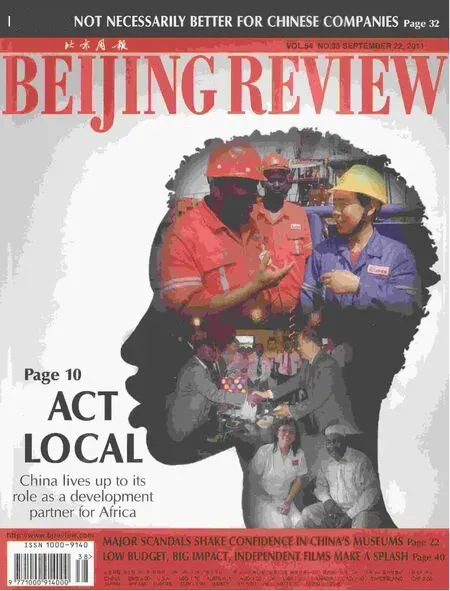WEEKLY WATCH
2011-10-14
WEEKLY WATCH
OPINION
Disputab le Fee Charges
An airport construction fee (or airport tax) and tourism development fund would continue to be collected from January 1 this year to December 31, 2015, says a document from China’s M inistry of Finance released on January 6.
The airport construction fee began to be collected in 1992. Its validity has been questioned ever since. A lthough the M inistry of Finance issued a document in 2002 saying the fee would stop in 2005, the collection continues. This time,w ithout being informed of anything, the public is told this fee w ill be continued for another five years. A legal hearing is needed to decide whether the fee should be continued.Besides, most of the airports in China are constructed from the state budget, which comes from taxation. If airports impose this extra fee on passengers,it’s equal to repeated taxation. Passengers don’t need to pay railway or bus station construction fees when they take trains and use the subway or buses, so why should they pay airport construction fees? The public is entitled to a hearing on the fee’s collection.
Yanzhao Evening News
Nothing to Do With Patriotism
O fficials from the M inistry o f Agriculture recently said, in the first 11 months of 2010, imported m ilk powder hit an historical high at 370,600 tons and in 2011, foreign brands w ill account for 50 percent of m ilk powder sold in the Chinese market. Because of this trend, China’s m ilk powder prices w ill be affected by international prices.
This disclosure im p lies w e have no choice but to wait for our domestic market to be conquered by foreign brands and let them make excessively huge profits in China. If you don’t want this to happen,please buy domestic dairy products.
It’s one’s freedom to choose what to feed their children and basically people w ill do what’s in their best interests. The almost complete failure of China’s domestic milk powder products is a consequence of market choice based on consumers’ rational preferences.
There was a turning point leading to the sharp downfall of domestic dairy products,the melamine accident in 2008. Before that,Chinese m ilk pow der made up 60 percent of the domestic market. M elam ine m ilk pushed Chinese consumers to im ported m ilk pow der. Anyway, comparatively,imported m ilk is safer, and at least no melam ine or things like sex hormones are being discovered now.
W hy do the Chinese prefer foreign m ilk powder? Is it because they don’t love their country and don’t want to support their national brands? No, it is their disappointment at domestic products such as melam ine-contam inated m ilk powder that pushed the consumers toward im ported m ilk powder.
Guangzhou Daily
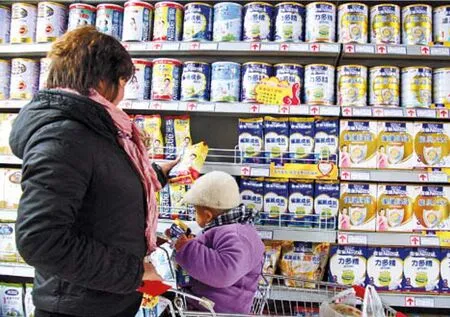
SAFETY MOVES: Dom estic dairy p roduc ts now seem risky to Chinese consum ers, and the Centra l Governm en t is se tting up a co rpo rate c red it m anagem en t system to ensu re dairy sa fety
Health o r Pro fits?
A lead poisoning incident in Huaining County, Anhui Province, at the beginning of the year attracted vast attention.
In 2009, there were six similar incidents and in 2010 the number rose to nine. The question is, why do such things happen again and again?
Today, there are many lead-involved factories in some underdeveloped regions in the country. In some places,the local government often neglects the pollution brought about by these plants,out of the consideration of the econom ic interests.
The air and water quality around leadinvo lved enterprises should be strictly monitored. But in some places, the focus is more put on production, or econom ic profits.
Most of the lead-involved enterprises are now dotted in econom ically backward areas, w here law s are not strictly im p lemented, and w here county-level environm ent w atchdogs are incapab le of monitoring lead and lead compounds.Therefore, while improving the local environment watchdogs’ technological level,it’s also important for local government to speed up the econom ic structure transformation and develop environment-friendly economy.
People’s Daily
Trees or Conc rete?
The U rban Planning Bureau o f Hangzhou, Zhejiang Province, recently held a hearing to consult residents on whether to replace a public green area w ith a highrise building. The move is applaudable.
The establishment of a hearing system show s the government’s w illingness to respect the pub lic’s opinions and safeguard their interests. Hearing procedures and regulations have been set up to ensure smooth operation. But, a regular hearing system is still absent from many places.
Against this background, this hearing in Hangzhou is praiseworthy in many aspects.Thirty representatives of residents w ho were opposed to the plan were invited to express their reasons.
This tells a hearing is a real opportunity for the public to voice about their concerns.W ith a stronger sense of the law and rights,a greater number of different voices are expected from the public.
Whether the hearing system can operate smoothly is a test of the government’s tolerance and openness. More heated debates and a w ider range of representation are expected at future hearings.
Workers’ Daily
SOCIETY
Copyright Crackdow n
Vendors of illegally copied films, music or other copyright products online w ill face up to three years in jail, the M inistry of Public Security announced on January 11 in a pledge to crack down on “rampant” piracy.
The ministry said the police had arrested more than 4,000 people suspected of intellectual property rights violations since a crackdown began last November. The campaign w ill continue until March.
Gao Feng, Deputy Director o f the m inistry’s Econom ic Crime Investigation Department, said more than 2,000 cases of piracy, involving more than 2.3 billion yuan($348 million), had been dealt w ith during the crackdown.
“The astonishing results, on the one hand, reflect the achievements of the police during the campaign, but they also underline the fact that IPR infringements are still rampant,” said Gao.
Innovation Encouraged
China’s spending on developing nanotechnology over the past five years was more than three times than between 2001 and 2005, a national nanotechnology coordination comm ittee said on January 11 in Beijing.
China invested more than 5 billion yuan($758 million) on research and development of nanotechnology between 2006 and 2010,compared to 1.5 billion yuan ($227 m illion)in the previous five-year period, according to the committee.
W ith the funding, three nanotechnology research centers at the national level were established, including the National Center for Nanoscience and Technology.
Moreover, the number of patent applications concerning nanotechnology in China became the second largest in the world by 2009. Nanotechnology patent numbers increased from 4,600 in 2005 to 12,000 in 2009, said the committee.
Lead Poisoning Probe
An environmental protection official in an eastern county has been suspended for improper supervision and poor law enforcement after an investigation showed that a battery manufacturing plant located alongside a densely-populated community was responsible for lead poisoning that sickened over 200 children.
Twenty-eight victims were hospitalized,local authorities said on January 8.
Zhao Yiping, Director of the Environmental Protection Bureau of Huaining County, Anhui Province, which adm inisters Gaohe Town where the children were poisoned, has been removed from his post after tests conducted on January 5 and 6 confirmed that excessive lead emissions from Borui Battery Co. Ltd. had polluted the nearby soil, said a spokesman of the provincial government.
Borui Battery failed the necessary environmental checks and was asked to close in August 2010, pending the improvement of its environmental protection facilities. However the company later resumed production w ithout notifying the government, said the spokesman.
Fighter Test
A Chinese m ilitary official said on January 11 that China’s military hardware development is not aimed at any other country.
Guan Youfei, Deputy Director of Foreign Affairs Office of the M inistry of National Defense, made the remarks while responding to a question on the reported test fl ight of China’s self-developed J-20 stealth fighter jet.
“The development of China’s m ilitary hardware is not aimed at any other country or any specific target and the tim ing was a matter of routine working arrangements,”said Guan.
Weaponry was developed to safeguard China’s national sovereignty, territorial integrity, and to adapt to the world’s m ilitary changes, as well as the constant development of new weapons, he said.
Guan denied the test flight was timed deliberately to coincide w ith U.S. Defense Secretary Robert Gates’ China visit on January 9-12.
China w ill always take the path of peaceful development, and adhere to the national defense policy, which is defensive in nature,he said.
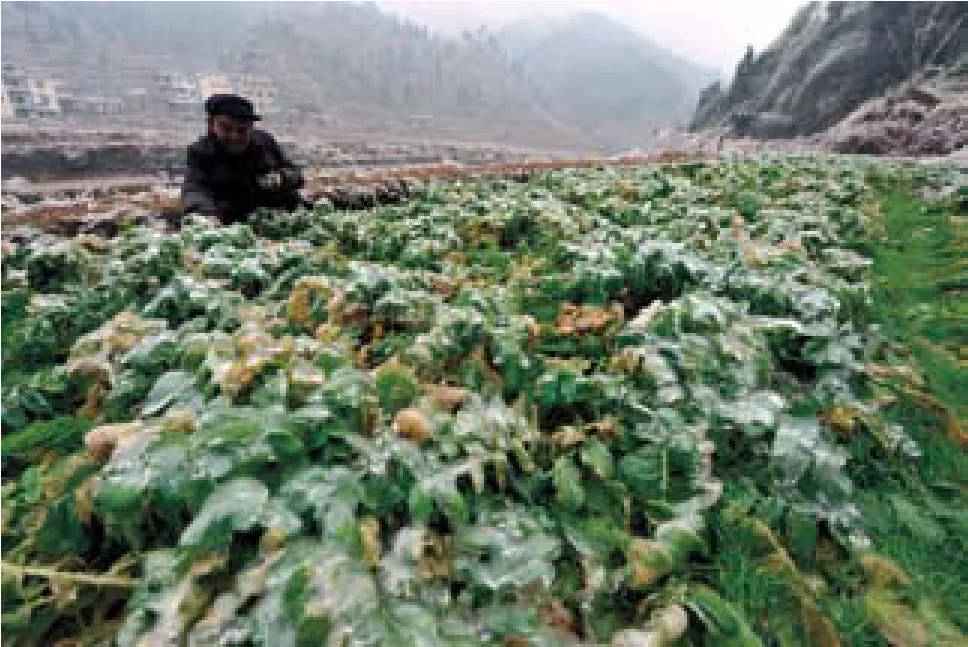
COLD WEATHER WOES A farm er in Guilin City,Guangxi Zhuang Autonom ous Reg ion,checks his ice-coated cabbage in the fie ld on January 8. Mo re than 2 m illion peop le in Guangxi had su ffered from dam age in flic ted by low tem peratures

ECONOMY
Yuan App reciation
The Chinese yuan strengthened to a record high against the U.S. dollar on January 13 to reach 6.5997 per dollar, according to the China Foreign Exchange Trading System.
China’s central bank announced on June 2010 it would further reform the yuan exchange rate formation mechanism to improve its flexibility.
On China’s foreign exchange spot market, the yuan can rise or fall 0.5 percent from the central parity rate each trading day.
The central parity rate o f the yuan against the U.S. dollar is based on a weighted average of enquired prices from all market makers before the opening of the market each business day.
GDP Revised
The grow th rate of China’s GDP in 2009 has been modified up to 9.2 percent from the previous 9.1 percent, the National Bureau of Statistics (NBS) announced on January 11,2011.
A fter the revision, the GDP’s current value was 34.09 trillion yuan ($5.15 trillion) in 2009, up by 39.6 billion yuan ($6 trillion) from the previous figure, the NBS said.
Based on the current calculation, the primary sector contributed 10.3 percent of China’s 2009 GDP, the secondary sector 46.3 percent and the tertiary sector 43.4 percent.
Investm ent in PE
Shanghai launched a pilot scheme allowing qualified foreign institutions to make private equity investment in China, marking an important step in the liberalization of China’s capital markets.
Select overseas investors can convert foreign currencies into yuan for private equity investment in China, the Shanghai Municipal Government said.
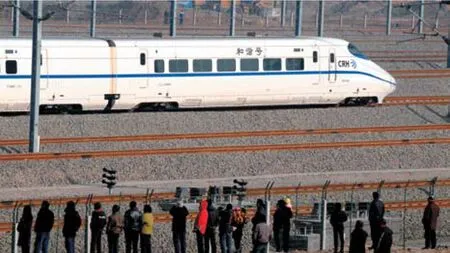
NEW RAIL HUB A high-speed train departs from a new ly built train sta tion in Xi’an, cap ita l o f Shaanxi Province. The station is the largest in no rthw est China and w as pu t in to use on January 11
The schem e has been dubbed a qualified foreign lim ited partner (QFLP),modeled after China’s qualified foreign institutional investor (QFII) program, which allow s foreign investors to buy Chinese stocks and bonds.
The pilot scheme would help “attract quality, long-term overseas capital, boost domestic investment, and would promote the development of a local private equity market,” according to the municipal government.
Aviation Investm ent
China has spent more than 1 trillion yuan($151.5 billion) building up its civil aviation infrastructure and purchasing aircraft over the past five years, said the General Adm inistration of Civil Aviation of China on January 12.
Between 2005 and 2010, 33 airports were built, and more than 70 were expanded and renovated. Another 11 airports are currently under construction.
By the end of last year, China’s civil aviation had boasted 1,604 aircraft, an increase of 741 from 2005. The general aviation fleet,meanwhile, has doubled to 1,000.
T-Bond Sale
The M inistry of Finance sold 30 billion yuan ($4.53 billion) of book-entry treasury bonds from January 13 to January 17.
The one-year bonds have a fixed annual interest rate of 2.81 percent, the ministry said.
The bonds became tradable on the exchange markets on January 19.
Interest on the bonds w ill be paid when the notes mature on January 13, 2012.
The bonds were the m inistry’s fi rst issue of book-entry treasury bonds this year.
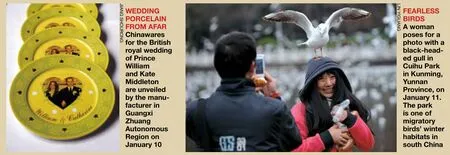
1. IRAQ
Visiting Kuw aiti Prim e M inister Sheikh Nasser a l-M ohamm ad a l-Ahm ad a l-Jaber a l-Sabah(right) review s hono r guards along w ith his Iraqi coun terpart Nu ri a l-Ma lik i in Baghdad on January 12. It w as the first visit to Iraq by a Kuw aiti p rim e m inister since the Gu lf War tw o decades ago
2. SUDAN
A m an votes at a po lling station in Juba in sou thern Sudan on January 9 in a referendum to decide w hether the region w ill rem ain united w ith the north or secede to estab lish an independen t state
3. INDIA
Tw o w om en hudd le around a sm a ll fire on a New De lhi street on January 11. Bitter co ld has b lanketed no rthern Ind ia, killing nearly 100 peop le in the past few w eeks

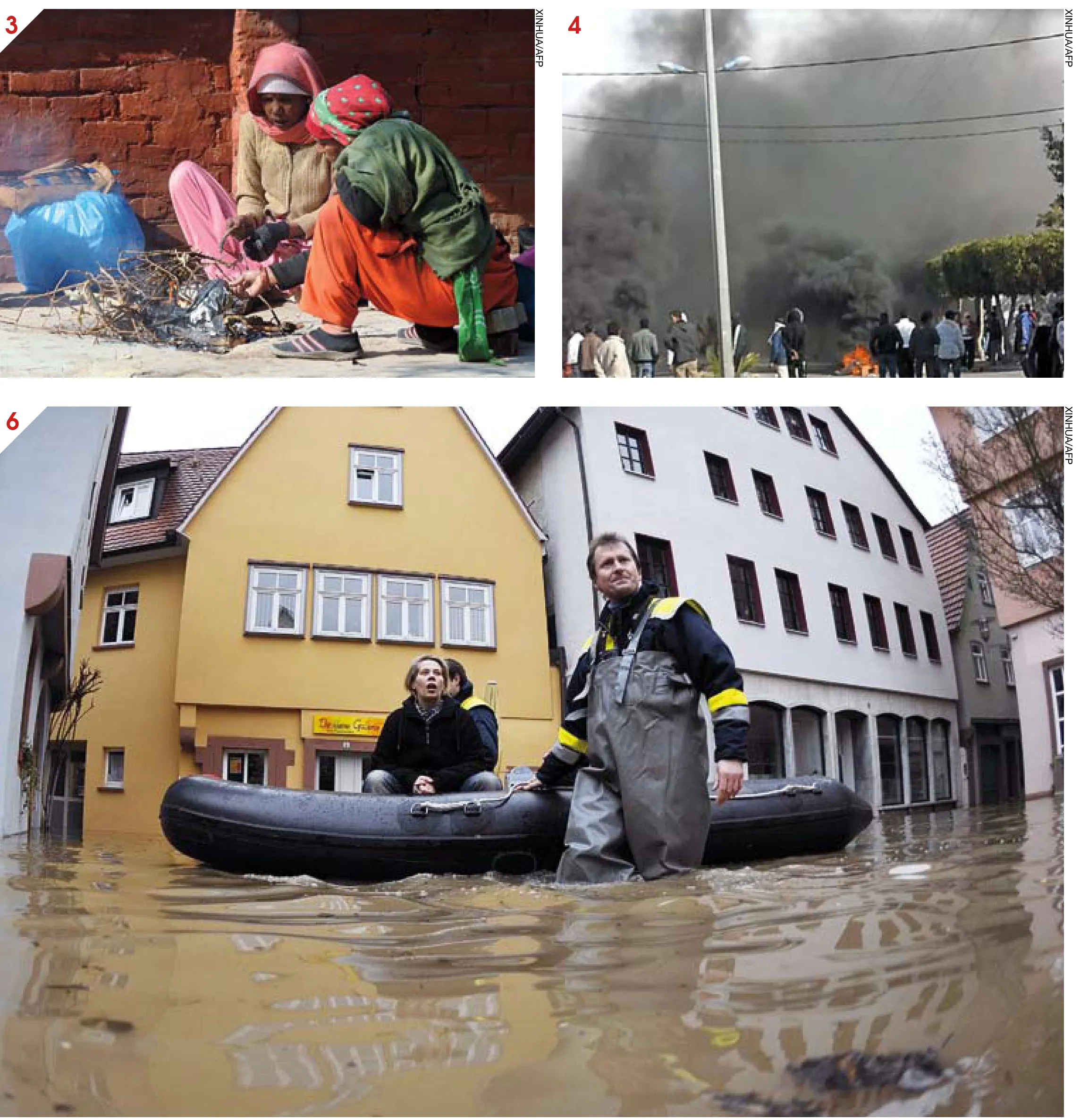
4. TUNISIA
Heavy sm oke rises in a tow n in sou the rn Tunisia a fte r a b loody c lash betw een dem onstrators and security fo rces on January 9
5. HAITI
A w om an p laces flow ers on a c ross at a cem etery in Port-au-Prince on January 11,a day be fo re the one-year anniversary o f the 2010 Haiti earthquake
6. GERMANY
Firem en escort a w om an to her house in sou thw est Germ any’s Wertheim on January 11. Melting snow caused rising w a ter leve ls and flooding, w hich com p licated the lives o f loca l residen ts
